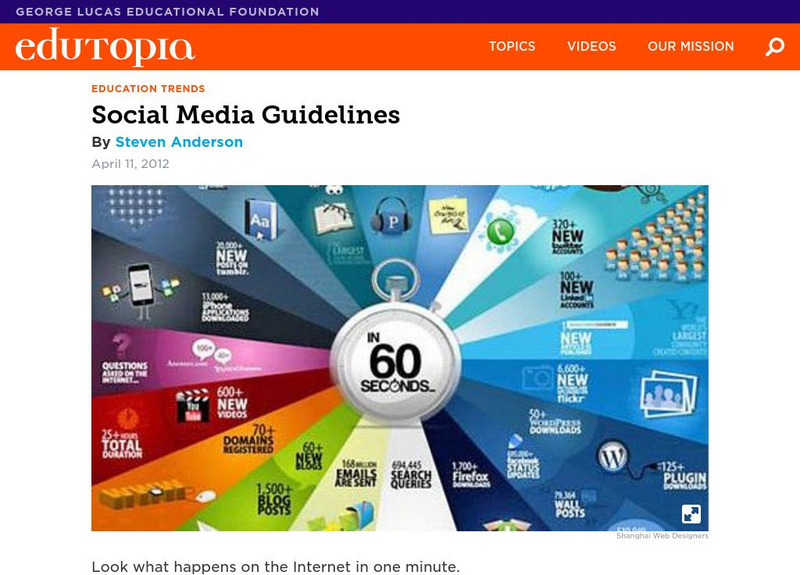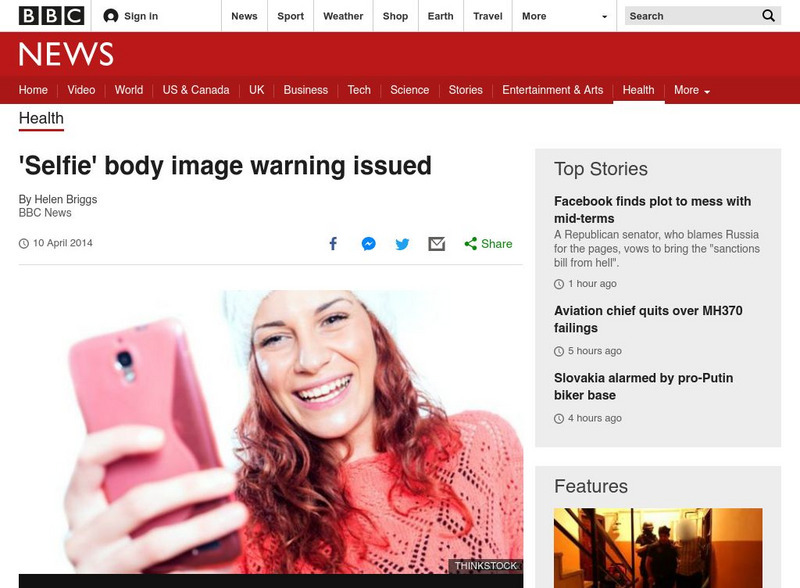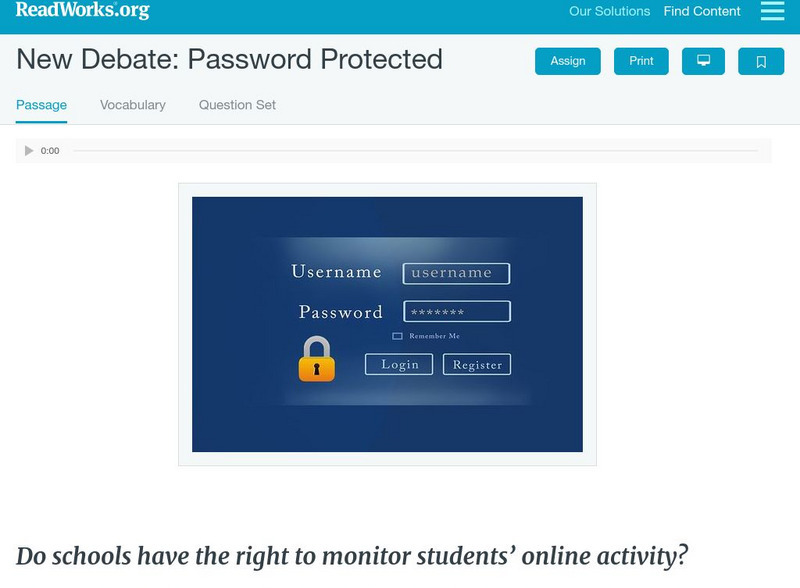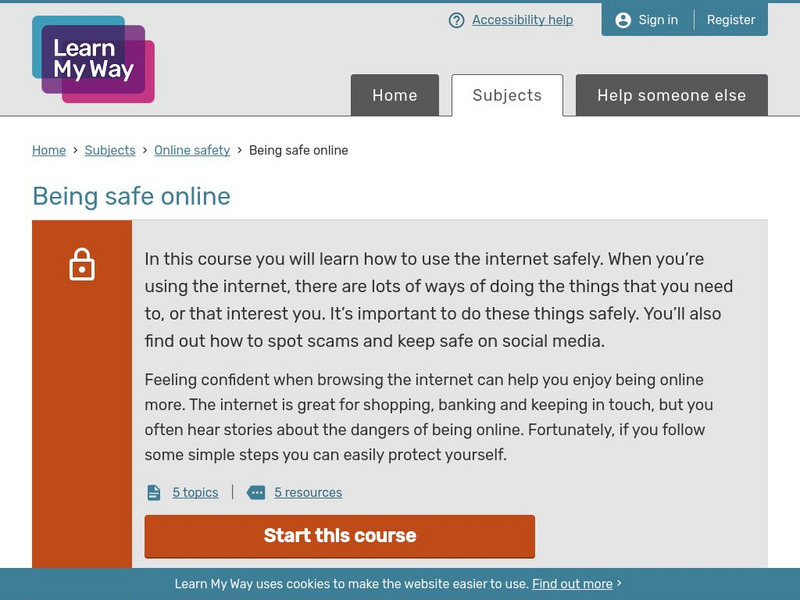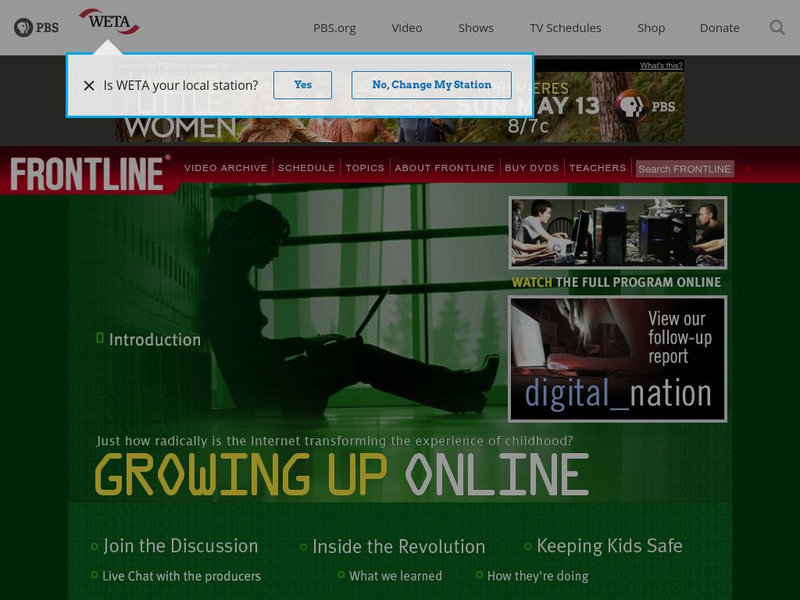Edutopia
Edutopia: Social Media Guidelines
Read about the ways in which educators can create social media guidelines that work to keep students safe.
Childnet
Childnet: Online Safety: Social Media
Social media are apps and websites where you can connect and share content with friends. On these services you are often able to share and view a whole range of media such as video, photos, music and chat. Popular social media services...
BBC
Bbc News: Selfie Body Image Warning Issued
Could too much involvement in social media cause body image issues. Read about what current research says on the subject.
Edutopia
Edutopia: Anti Social Media: Spirit Day: Educators and Parents: Cyberbullying
Learn how educators and parents join together on Spirit Day to prevent online bullying of LGBT youth.
Childnet
Childnet: Online Safety: Educators Pack for Online Safety Awareness
The internet provides educators with a great tool for teaching young people, communicating with others, and sharing successes with the wider community. In order to make the most out social media, technology and the internet, we have put...
Other
Connect Safely: Connect Safely: Smart Socializing Starts Here
This resource offers students and adults information in order to help young people socialize safely online.
Childnet
Childnet: Online Safety: Sharenting
Sharenting is when a parent or care-giving uses the internet to share news, images, videos, and information about their child. It mostly takes place on social media and in some cases on blogging sites. This site features questions,...
Childnet
Childnet: Online Safety: Get Answers
Got questions about how to stay safe online and what to do when things go wrong? Get answers here! It includes questions concerning cyberbullying, meeting people from online, online gaming, time spent online, what does the report button...
Childnet
Childnet: Online Safety: Working With Children and Young People Online
We have created a practical guide for organizations working with children and young people online. This guide focuses on the issues that organizations told us they needed the most support on. These include: the key risks children and...
Other
Childnet International: Digizen: Social Networking Detective
This social networking profile has been created to stimulate discussion about safe and potentially unsafe practices and features on social networking sites. Together with the accompanying questions, it has been designed to highlight ways...
PBS
Pbs Learning Media: Everyday Learning
Learning does not take place only in the classroom. Learning occurs naturally, every day! This KET collection uses original animation and wonderful, visual images to introduce basic concepts of math, science, social studies, art, and...
Common Sense Media
Common Sense Media: Education: Lesson: Feeling on Display
Are girls and guys judged differently when they post photos online? Students explore the pressures many teen girls and boys face to keep up appearances online. PDF (requires Adobe Reader).
Common Sense Media
Common Sense Media: Education: Who's Looking at Your Digital Footprint?
Our digital footprints can have a powerful impact on our future. This can be a scary thought, given that what's in our digital footprint isn't always in our control. Teach learners that digital footprints are an opportunity to showcase...
PBS
Pbs Learning Media: Tre, Maison, Dasan: Collection
Tre Maison Dasan is an intimate portrait of three boys growing up in Rhode Island, each with a parent in prison. Each boy is very different, possessing different attributes and surrounded by different environments. Told directly through...
Childnet
Childnet: Online Safety: Fake News
Fake news most often describes inaccurate or false information spread online by either news services or via social media. However, the phrase is sometimes used in other ways such as to describe anything thought to be false, misleading or...
Goodwill
Gcf Global: Internet
A website with links to tutorials on various Internet Skills including Internet, Online Safety, Social Media, Email, and Google.
Childnet
Childnet: Online Safety: For 11 14 Year Olds
This age group may spend lots of extra time online, and on their devices which is hard to manage. For those who are not yet 13 years old, they may feel extra pressure to join social media to stay in touch with friends. Use our activities...
Common Sense Media
Common Sense Media: Education: Lesson: Pause and Think
[Free Registration/Login Required] In this lesson, the Digital Citizens teach young scholars how to be safe, responsible, and respectful online. Includes slideshow, video, lesson plan, song and lyrics, poster, coloring book, and...
Common Sense Media
Common Sense Media: Education: Lesson: Talking Safely Online (Grades 3 5)
During the course of this lesson plan learners learn that while people can develop rewarding friendships online, they should be cautious with online-only friends and never reveal private information without asking a parent or trusted...
Read Works
Read Works: News Debate Password Protected
[Free Registration/Login Required] An informational text debating whether or not schools have the right to monitor what students post online. A question sheet is available to help students build skills in reading comprehension.
REMC Association of Michigan
Remc Association of Michigan: 21 Things4 Students: 5. Digital Footprint
Each time you log on to the Internet, use your cell phone, or do anything digitally you are leaving a digital trail. In this tutorial, you will be completing five quests. In the first, you will make a record of your online activities...
Learn My Way
Learn My Way: Being Safe Online
In this online course, students will learn how to use the internet safely, how to spot scams, and keep safe on social media.
PBS
Pbs Frontline: Growing Up Online
Information and analysis on the practices and habits of children and teens who live their lives online. Focus is on teen culture in the digital age and on how online media have intensified fears of the dangerous dimensions of adolescence.
Childnet
Childnet: Online Safety: Video Calls
Video calling allows us to speak to our friends and family, and see their faces, which is especially valuable when we are unable to see them in person. It has also allowed lessons, and contact with schools, to continue during the...
